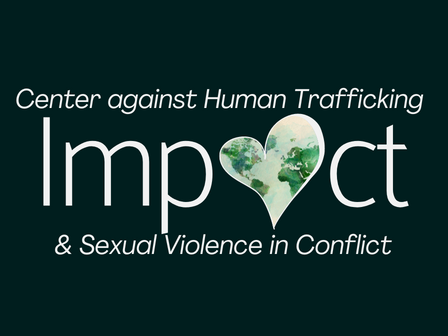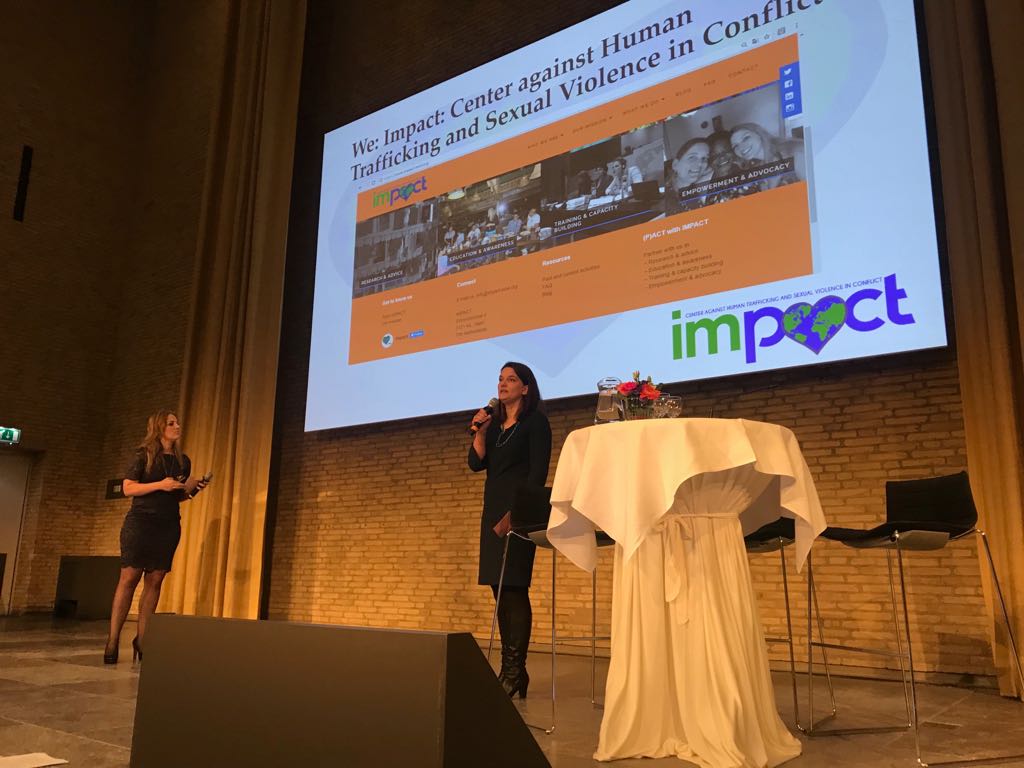dr. Eefje de Volder & dr. Anne-Marie de Brouwer
(IMPACT: Center against Human Trafficking and Sexual Violence in Conflict)
(given on 9 March 2018 at Tilburg University during the symposium
‘Entrepreneurship in the 21st Century’ on the occasion of the inaugural address of Tilburg University’s first Distinguished Professor of Practice Ronald de Jong)
Introduction: creating a better world
We consider social entrepreneurs as the entrepreneurs of the 21st century, trying to address the big social (wicked) problems the world is faced with today, from climate change to poverty and from conflict and migration to human exploitation. A social entrepreneur is not necessarily something you become out of deliberate choice: you do not wake up in the morning one day and think: this is the day that I am going to change the world. It is rather an intrinsic feeling of injustice that you carry along with you as long as you can remember, a feeling that you want to contribute to a better world. In the 90s, it was our own government here in the Netherlands that tried to make us more conscious about the environment with the slogan; ‘een beter milieu begint bij jezelf’ or ‘a better environment starts with you’. And we think that most social entrepreneurs will agree that this slogan in the broadest sense ‘a better world starts with you’ reflects their core values very well.
The traditional academic world
Both of us have worked for years at the university and continue to do so on an ad hoc basis. While working at the university, doing research and teaching, it soon became clear that the incentives in the university system do not really motivate or stimulate academics to invest in impact projects. The foundations of the university system make it, overall, difficult to contribute to social innovation while having to meet the formal requirements set for academics at the same time. While social innovation is stimulated in policy, it is something you have to do on top of research, top A journal publications and education and it is not likewise being accredited. While the university potentially offers an environment of exchange of knowledge, of renewed insights, of social innovation, the university result in research that is published in academic journals for peers but not often accessible for the greater public or translated to useful tools to make the changes needed for the society at large. The market forces that have entered the university realm require measurable output that do not necessarily involve practical solutions for societal problems, resulting all too often in the academic Ivory Tower effect.
But it is precisely contributing to solving problems in the broader society that should be the rationale for the university’s existence.
As social impact was our main driver in dealing with our topics of concern – human trafficking and sexual violence in conflict – we found a place outside the university structures to pursue our dream.
So what is it that we do exactly?
We: IMPACT: Center against Human Trafficking and Sexual Violence in Conflict
We are IMPACT. We ACT and make a PACT for IMPACT; impact by preventing and addressing human trafficking and conflict-related sexual violence (www.impact-now.org). Two crimes which share many similarities. Two crimes that involve millions and millions of victims worldwide. Our vision is to have a world in which there is no longer a place for these crimes. A world free of human trafficking and sexual violence in conflict.
How do we aim to end human trafficking and conflict-related sexual violence? We aim to end this violence through systemic change. Not only supporting survivors of these crimes in a practical manner, but by trying to change the system on multiple interrelated levels. To a large extent we could say that ‘our product’ is our knowledge. And to prevent and address human trafficking and conflict-related sexual violence we must influence policy makers, professionals, youth and others. From the international level all the way to the local level and the other way around.
We do this in the following four ways; via (1) research & advice, (2) education & awareness, (3) training & capacity building, and (4) empowerment projects & advocacy. Each level targets another audience through which systemic change can come about. An example is our 2-weeks Summer School on conflict-related sexual violence and human trafficking which we are going to teach for the second year here at Tilburg University. These students are the new generation who can make actual change in preventing and addressing the two crimes. Another example includes training of professional judges, prosecutors, defence and victims’ counsel on ways to deal with conflict-related sexual violence in the court room. We recently gave such a training in Uganda to court officials of the High Court (International Crimes Division), as they were confronted with the first high profile case that included conflict-related sexual violence charges against the accused, an alleged war criminal. And above all, to have systemic change, we always include the voices of those who suffered the crimes in the first place; only through consulting and working with them, these complex problems can be tackled. A research on how human trafficking in the Netherlands can be prevented and victims can be earlier identified by interviewing victims about their own views and experiences is an example thereof.
First came the work and then the theory
For us the idea of setting up IMPACT came first. Only after our work became operational it was labelled by others as socially innovative. An example of such a socially innovative project is our theatre project in the country side of Rwanda where ways of exchanging information are limited and sexual violence (both during the genocide as well as in modern days) is highly prevalent. To reach these remote communities we worked on a plan to set up a mobile Rwandan theatre play (in cooperation with survivors of sexual violence, a Rwandan director, script writer, actors as well as counsellors) that has the potential to reach thousands of people and to take away shame and stigma often found with victims. Rather, the topic becomes one that can be discussed and understood, and counselling can be provided. Awareness raising and education is key in preventing crimes from happening again and the form in which it is presented need to be adapted to the local situation. This project and many others made us social entrepreneurs, without us consciously deciding on it. Only when labelled by others as such, we started – yes, we remain academics at heart – to look into the theory of what being a social entrepreneur is about and discovered that we indeed quite look alike!
John Elkington, a world authority on corporate responsibility and sustainable development, defines the core characteristics of highly effective social entrepreneurs in his book ‘the power of unreasonable people’.
Social entrepreneurs: unreasonable people, insanely ambitious, systemic change
Hmmm, unreasonable people? Elkington indeed states that among the main characteristics of social entrepreneurs you can find unreasonable or even crazy people that are insanely ambitious and who seek systemic change. That doesn’t sound very appealing… However, there is a truth in this. Social entrepreneurs are unreasonable people. Unreasonable in the sense that these people try to transform the world they live in as they believe the system is not working as it should be. Whereas reasonable people adapt themselves to the world they live in, unreasonable people try to change it. They do not accept the world as it is currently functioning. In effect, by trying to change the system social entrepreneurs are game changers.
And to be able to do so, social entrepreneurs are – admittedly – a bit stubborn. They swim against the stream by doing things that others may think is just impossible. Indeed, most of the time social entrepreneurs have been called crazy by different people on one or multiple times in their career. Social entrepreneurs do not take no for an answer. They continue to find ways to realise their goals. For them the glass is always half full. Social entrepreneurs are driven by change, not only out of their self-defined ambition but also because they sincerely seek to make an impact for others. It’s their passion for change that drives them. And since this passion will always be present, the drive to make an impact will too. Admittedly, dealing with stories of human trafficking and conflict-related sexual violence are not always ‘easy going’; yet these crimes are very real and only by understanding them one can also address them. We have seen the pain with survivors, but also their strength and resilience. Because of this, we have a passion for systemic change, a drive to make an impact for these people.
For example, yesterday (8 March 2018) it was International Women’s Day. On this day we launched our first crowdfunding campaign (www.impact-now.org/product/crowdfunding). The goal of the crowdfunding is to educate on and create awareness of conflict-related sexual violence and to empower the survivors of these crimes. How? By sharing the stories and portraits of Rwandan survivors of sexual violence in an updated book [‘The Men Who Killed Me’ (2009)], via an interactive platform to be used in schools and universities, and by providing concrete possibilities for survivors to start their own businesses or to educate their children. On the picture you see the survivors of sexual violence we are talking about. Strong and resilient people. Our friends and teachers in life! Through their stories in the book they have inspired and changed not only us, but people all over the world. Some changed their career path to study gender or conflict studies, others stood up in class and bravely discussed their own sexual victimization. It’s time to update their stories to understand how their lives have unfolded in the past ten years, which will show even more the strength of these people.
And as social entrepreneurs – who only set up IMPACT less than a year ago – we have a dream… to become within 4-5 years an expert center in the field of human trafficking and sexual violence in conflict worldwide, ultimately with regional offices in several continents! Overly ambitious? We do not think so!
Through co-operation unrealistic visions become reality
That brings us to one of the following characteristics of social entrepreneurs as identified by Elkington…. It is only by co-operating with others that unrealistic visions become a reality.
Like Elkington, we believe in the power of working together! Only by co-operating with others real change is possible. Wicked complex problems – such as tackling human trafficking and conflict-related sexual violence – cannot be solved by us alone. Again, it is only by co-operating with others that unrealistic visions become a reality. People like you and me, people with different backgrounds and skills, and frustrated about their environment and seeking for ways to change it. It’s always a team effort. And the good news is; everybody can be a social entrepreneur or … a social consumer.
Although IMPACT’s vision – a world free of human trafficking and sexual violence in conflict – may sound overly ambitious, this is no longer the case when you work together with others. You then realise that the work is not only doable, but once you have started it and done it, you can continue to build on it. In our case, we start to bring organisations in the Netherlands working in the field of conflict-related sexual violence, together. By doing this our aim is to address gaps in knowledge, skills, co-operation and impact in these fields. This has never been done before – which is somehow surprising you would think – but we believe that through our joint co-operation ‘the whole is greater than the sum of its parts’ (Aristotle).
Impact beyond profit
Another distinctive characteristic of social entrepreneurs according to Elkington is that in contrast to traditional entrepreneurs the business is about more than financial gain alone. The profit of social entrepreneurs is not solely based on money, but also on social and environmental impact, a so called blended value.
The social environmental impact (how the work has made a difference, impacted the lives of others, contributed to a better world) is an important driver and therefore should be valued similarly as financial gain. The problem is that the current market is still not equipped to measure the value of impact profit the way we are able to measure financial profit.
For example, in our work we set 10% of our income apart for empowerment projects. This means that we allocate money to support or empower victims of trafficking and sexual violence in conflict. During yesterday’s International Women’s Day we were able to offer a day out for female survivors of human trafficking in the Netherlands. This is also impact. But it is simply measured in a different way.
Another way in which we contribute to empowerment is through a coffee project (in cooperation with the Mukomeze Foundation, but also students of the Outreaching Honors Program at this university) that empowers women through microfinancing and offers a market for the coffee in which they can sell for more competitive prices than locally which results in more revenue (www.rwandesekoffie.com). This project empowers these female entrepreneurs because they can make their own living, but it also contributes to their self-confidence and well-being as well as the well-being of their family at large. At the same time this project impacts companies and social consumers here in the Netherlands, who can buy coffee with a positive story. The financial profit in this project is a side effect, it is the impact that matters most in the end.
Concluding remarks: ‘Be the change you wish to see in the world’
This university is determinant to take the necessary steps to allow social innovation and social entrepreneurs to flourish. Tilburg University has indeed already taken several concrete steps to make sure that social entrepreneurship is fully embraced on all levels. With today’s appointment of Ronald de Jong as Tilburg University’s first Distinguished Professor of Practice, the university shows its further commitment to make the university environment susceptible for social innovation. We encourage Tilburg University to continue to take the lead in this.
The educational system, from primary school to university, plays an important role in creating an environment for social innovation. When looking back, both of us had this allergy for injustice since we can remember and would go against it when confronted with it. As early as then we would also be confronted with people who got uncomfortable when adolescents would question the very system they saw as a fixed reality. When not knowing any better, the demotivation by those who are in fact scared of change can discourage you in thinking big and striving for change. The educational system, and the university in particular, is the right place for unthinkable solutions to be developed and discussed, after all only then transformation will come about.
As we mentioned the good news is that everyone can create social impact, not only as a social entrepreneur but also as a social consumer. Because, at the end of the day, when you look back at your life’s footprint, what will you value most: the money that you have earned or the products that you have bought or the difference that you have made in other people’s lives? Then wat better to do than to earn your living by impacting the lives of others? so go on and ‘be the change that you wish to see in the world’ as Gandhi once told us (and of which we are reminded every day as the quote is on the wall in our office). That is surely what we are going to continue to do.




